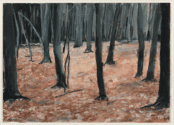Because we mourn the loss of those things we love, we should never stop grieving over the follies of humankind and the sorrows of the earth. To cease grieving is too give up on love.
By a refusal to grieve, by lapsing into a host of manic evasions, one risks becoming a monster—a being devoid of empathy that, in an attempt to avoid experiencing suffering, will wound, demean, and exploit the things of the world.
In collective terms, we know this state as the agendae of empire. Conversely, to embrace one’s humanity, one must accept being shattered by grief, yet restored by love, simultaneously. Being in unashamed possession of a heart, both broken and whole, serves to mitigate the compulsion to act in the manner of a monster.
[box] shattered by grief, yet restored by love[/box]
The price of self-deception (e.g., political partisanship, monomaniacal careerist striving, compulsive consumerist distractions) is not worth the palliative relief provided. To endure the undoing of illusion, one is tempted to retreat from life into a bubble of isolation or partisan group-think.
Somehow, somewhere along the way, one can become convinced the life that, as imagined in one’s entitlement-addicted mind not the byproduct of an ongoing, humility-shepherding dialog with the world, must be made manifest by relentless deed and actions, no matter how dishonest and ruthless. In this way, an individual is prone to becoming an exploitation maintained empire of one, a walking analog of the state that sired, weaned, and socialized him.
How could it not be so?
Of course, by his callous disregard of the humanity of others, he makes miserable all that he touches. By his hollow ambitions, he demeans himself, and the happiness that he seeks becomes ever more elusive, and, caught in a self-resonating circuitry of self-defeating actions, he will eventually bring to ruin all near him.
This is how empires fall, and this is the means, on an individual basis, how its citizens move it along towards the precipice.
Conversely, it proves propitious to face the twilight of treasured convictions, to survive the collapse of the empire within, a decision that can provide practice in surviving the collapse of its collectively constructed, outward analog.
Often, events in life can play out badly. Painful as it is, we must not flee from reality. When one becomes prone to acts of habitual evasion, there is little chance to exist with one’s dignity intact; it becomes impossible to live with a sense of grace.
Rationalizations are by nature ugly: They are the disingenuous face of desperate souls who have come to fear others and hold a contemptuous dread of life itself. In this way, you can mistake your defense mechanisms deployed against grief and dread as comprising a large portion of your personality.
Take a moment to contemplate what an awful circumstance it is to incessantly pass by your true self, sans recognition, in a similar fashion to the manner one regards an anonymous stranger passed on a teeming boulevard.
[box] Will you create a bristling fortification of convenient cynicism?[/box]
The dilemma involves, to paraphrase Rilke, how will you spend the days of this finite life? Will you give into the compulsion to build a construction of ghostly artifice—life lived as a self-perpetuating lie that you are in control, that the caprice you conjure to ward off feelings of despair, regarding your powerlessness over the coursing flow of events, is an accurate description of your true nature? Will you create a bristling fortification of convenient cynicism, allowing you to remain ensconced within a dead womb of bile and ashes?
Or will you risk being the midwife of your own tale, grasping that there exist forces within you, when in dialog with the soul of existence, that are greater than the sum of your assumptions, that exist deeper and beyond life-negating banalities, such as winner and loser, shame and pride, and grief and happiness?
“So don’t be frightened, dear friend, if a sadness confronts you larger than any you have ever known, casting its shadow over all you do. You must think that something is happening within you, and remember that life has not forgotten you; it holds you in its hand and will not let you fall. Why would you want to exclude from your life any uneasiness, any pain, any depression, since you don’t know what work they are accomplishing within you?” ―Rainer Maria Rilke
Slightly more than eleven years ago, on September 11, 2001, my wife and I awoke to the blaring of sirens, one following the next. Our air conditioning unit was broken and our windows were open. The air carried an acrid odor.
I checked my email and stacked in my inbox was an avalanche of messages, all inquiries bearing a unifying theme…”Are you alright?”
I called out to my wife… to plug in an old black and white television set, because something terrible, it seems, was happening here in New York.
The television roused itself to life just at the moment of the collapse of the North Tower.
This was before the image was fetishized in the American imagination, was exploited by two U.S. presidential administrations to justify thousands of acts of military aggression on people of distant lands who only share one trait in common—they were born of the Islamic faith.
This was before George W. Bush played dress-up in military costumes and pranced about at military bases and the decks of naval vessels. This was before President Obama’s brandishing of kill lists, his normalization and codification into law of Bush era war crimes and constitutional and human rights violations.
This was when the archetypal image of a collapsing tower seized the mind, engendering an analogous collapse of one’s mooring and verities. The quotidian touchstones of daily life had vanished, as did alienation.
We needed each other. Empathy and generosity replaced self-absorption and the illusionary urgency of urban life… vanished were, monomaniacal commercial agendas and compulsive distractions. The streets were gauzy with veils of smoke; the veils had been removed from our hearts.
A feeling akin to love allowed us to face horror, and take ambulatory refuge in compassion and beauty.
Cell phones and bottled water were proffered to strangers. As night fell, candles flickered in public squares; there was the sound of sobbing and impromptu singing. The scene seemed like a cross between the London Blitz and Woodstock. One was fully alive in the realm of death.
[box] a cross between the London Blitz and Woodstock[/box]
It would have been lovely if that had been the lesson we carried forth from that day, a decade and a year ago. Alas, the political agendas of militarist imperium carried the day. Tribalism trumped the universal exigencies of our common humanity.
Our leaders behaved despicably, and continue to, and we allow it to happen e.g., Democrats boast of Obama “getting Bin Laden” in a reprehensible attempt to gain political leverage from the tragedy… actions that Democratic partisans would have, rightly, shamed a Republican president for attempting to exploit.
Yet the sublime of that day is available to us still. Providentially, there is no need for actual towers to fall… only one forlorn, interior tower to which we have exiled our humanity. No one needs to die… other than the entity within who induces us into habitual denial and exclusively self-serving pursuit.
“[R]eexamine all you have been told in school or church or in any book, and dismiss whatever insults your own soul; and your very flesh shall be a great poem, and have the richest fluency […]”
—Walt Whitman, from the 1855 preface to Leaves of Grass
Phil Rockstroh is a poet, lyricist and philosopher bard living in New York City. He may be contacted at: phil@philrockstroh.com. Visit Phil’s website or at FaceBook.
Part One of this essay is here
Phil Rockstroh is a poet, lyricist and philosopher bard living in New York City.
Yet a bio amounts to dharma for dimwits: It defines a human being in the same manner and degree of veracity as a restaurant menu describes the various slabs of meat offered … commodified things that were once living beings.



















